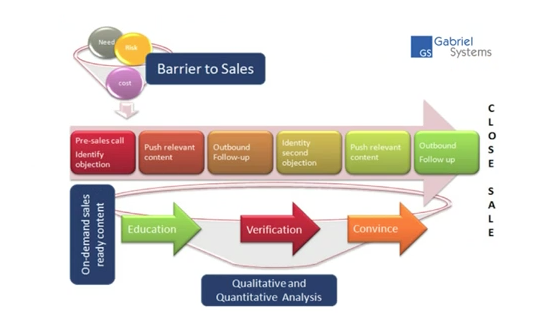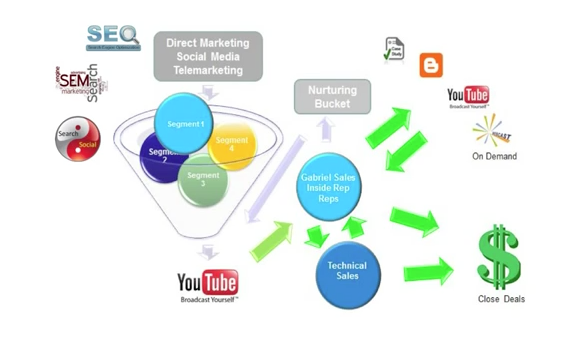by gabriel_sales | May 6, 2013
 In 2013, many B2B companies are trying to improve their sales and marketing by hiring a new sales representative to join their sales team. While allocating more time and effort to the task of sales is the right thing to do, hiring a full-time rep internally might not be your best option. This blog explores how hiring an outsourced sales team can help you achieve your business goals more efficiently and effectively than an internal rep.
In 2013, many B2B companies are trying to improve their sales and marketing by hiring a new sales representative to join their sales team. While allocating more time and effort to the task of sales is the right thing to do, hiring a full-time rep internally might not be your best option. This blog explores how hiring an outsourced sales team can help you achieve your business goals more efficiently and effectively than an internal rep.
If you look at the process of hiring a new in-house salesperson, you see that it is a considerable expense to you. You have to spend time searching for the right person and training him or her once found. After all of this, you still do not come close to the amount of ability, competence and connections you have in a full team of people. In addition, you may be hesitant to let an internal person who is not working out go because of the significant investment you made beforehand. We therefore believe you stand to gain more success from hiring an outsourced team than you do with an internal rep.
Here are four more reasons we believe B2B companies can benefit from hiring an outsourced sales team:
1) Low overhead cost and zero fixed payroll or benefit costs. An outsourced sales team has its own office space, phones and computers to use, eliminating those costs for you. If you go with the outsourced team you also do not have to treat the team as your own employees in terms of payroll and benefits.
2) Access to a larger and more resourceful sales team. In most situations, the cost of an entire outsourced sales team is the same as hiring one full-time rep internally.
3) Improved sales coverage. When you have multiple people, you are able to increase the number of people you reach and expand your list of potential customers.
4) Advantage of previously established business relationships. By hiring an outsourced team, you gain access to a variety of connections and contacts you can exploit to gain profit for your company.
If you would like to know more about the pros and cons of an Internal Sales Rep vs. Outsourced Sales Team, please reach out to us at Gabriel Sales by contacting us here.
by gabriel_sales | May 2, 2013
 In our work as a B2B outsourced marketing and sales company, we have found that many people have a misunderstanding of what sales and marketing outsourcing companies do. This blog explains these misconceptions and details how an outsourcing company uses their services to solve business problems and drive sales growth for their clients.
In our work as a B2B outsourced marketing and sales company, we have found that many people have a misunderstanding of what sales and marketing outsourcing companies do. This blog explains these misconceptions and details how an outsourcing company uses their services to solve business problems and drive sales growth for their clients.
At Gabriel Sales, we understand that many businesses are just now beginning to look into the possibility of outsourcing marketing and sales. Most B2B businesses have no prior experience working with an outsourcing company, they therefore may be confused or apprehensive about hiring one.
To help clear up some of this confusion, here are the five myths or misconceptions about sales and marketing outsourcing that we see the most:
1. “If I outsource, I will lose control of my sales process.”
While it may feel as though you are handing the keys to your Corvette convertible over to a complete stranger, this does not mean you have to lose control over your sales process. It is no doubt unnerving to hand the reigns over to someone else, but we have found that open communication between both partners can alleviate this tension. At Gabriel Sales, we keep our clients informed of all of our activities and progress at all times and during all situations.
2. “Hiring a full-time sales rep will not do anything for me.”
We understand many businesses do not want to staff a sales rep full-time, but our experience shows us this seldom works in the long-term. Usually, a company will start with a part-time rep, but soon needs to scale to full-time. A sales and marketing outsourcing company can help you to determine what the most effective balance is for you in this regard and help you to implement it. Gabriel Sales offers temporary, part-time, and full-time options for lead generation and inside sales.
3. “I don’t need outsourcing because I already have a sales team.”
Just because you have a sales team in place already does not mean you cannot benefit from sales outsourcing. Many of our clients already have internal sales teams of their own. It is our job as an outsourcing company to improve on what you have. We can act as an extension of your current sales team, and if we do employ a sales rep, it is usually exclusively for setting sales appointments, sales qualifying or B2B lead generation. We have also been taken on primarily to aid in the launch of a new product. There are a variety sales services an outsourcing sales company can provide to an existing sales team; to see more of them, check out our services page.
4. “My recruiting process cannot be improved.”
If you are now considering outsourcing your sales and marketing, that is a good indication your current process needs improvement. An outsourced sales company can certainly help if you do not have years upon years of experience attaining salespeople who can execute at a high level. Hiring an outsourcing company allows you to take advantage of the vast sales expertise experienced sales personnel provide to them and therefore saves you the time and money usually put into the recruiting process.
5. “Hiring an outsourcing company builds the outsourcer’s brand, not mine.”
Once you have hired an outsourcing company, their job should always be to sell you and not themselves. At Gabriel Sales, we perpetually put the client first and train our sales reps to act as your employees during all business calls and interactions. We define our success in terms of your success.
We hope this blog helps to clear up any confusion you may have regarding sales and marketing outsourcing companies. If you have further questions or concerns, or would simply like to know more about B2B sales outsourcing, please feel free to contact us.
by gabriel_sales | Apr 19, 2013
 This blog is a quick overview of what defines B2B demand generation and some of the approaches your company can take to succeed.
This blog is a quick overview of what defines B2B demand generation and some of the approaches your company can take to succeed.
What is B2B demand generation?
It’s about giving marketing a sales quota, so let’s start by defining what it’s not. B2B demand generation is not about branding, awareness, positioning or value propositions. These can be important and even critical, but demand generation is not about things that you need a research team or survey to measure.
It’s about giving marketing a sales quota, because buyers now digest an average of 10.7 pieces of content before finalizing their purchasing decisions. So, you need a sales content strategy that supports your inside reps and supports how the buyer buys.
B2B demand generation and lead generation mean different things:
- Demand generation is the marketing and inside sales machine that put deals in and moves them through the pipe.
- Lead generation is the measurable output.
B2B demand generation’s job is to drive and close business. Demand generation sources maketing qualified leads, takes leads from marketing qualified to sales qualified and then engage, nurtures leads not ready to buy (until they are), and supplies the closer with content required to take to proposal and close.
Successful B2B demand generation requires sales content that educates, verifies and finally convinces the customer to transact, along with the right technology to track digital consumption and content repurposed and pushed across media types, all leveraged by a well-trained inside sales team. B2B demand generation is about your reps and marketers having the right conversations and sharing the right information in the right channel at the right time in the customers buying cycle. Demand generation is about taking the content you created to support your reps and repurposing it across digital platforms and social media, so your customers can find you and you sales reps have third-party verification ground cover. Your B2B demand generation engine needs a seamless sales process that integrates sales reps, leverages digital content and improves sales results with the right sales technologies stack.
Here is what a sales driven B2B demand generation process looks like:

First, you put prospects in the pipe using reps, tools, SEO, SEM and social media. You then profile, qualify and engage your prospects. Next, you address one sales objection or buyer stage need at a time. Finally, you push content or nurture until business is closed.
Here is what a mature demand generation ecosystem looks like:

As your buyer move through their buying process (and your sales process) through your initial offers, your inside reps, product specialists and senior talent help the buyer buy seamlessly. You need to do things this way because if you are not making it easy for the buyer, you are not taking competitive advantage of every opportunity you have for sales and marketing ROI efficiency.
To compete, you need to align your teams around how the buyers buy, provide feedback loops to your marketers, create content efficiently, and re-leverage that content every way possible.
How do you sell faster? More effectively? Grow your business? You have two options:
#1 Take up to two years to build your own.
or
#2 Pick the right sales team and sales marketing team to fill your gaps.
Gabriel Sales build machines from scratch or turns around stalled efforts. We specialize in taking existing products into new markets and taking new products into existing markets. We have a diverse B2B sales and marketing team experienced in selling to multiple verticals with solutions for companies selling to both the Fortune 500 and SMB markets that need to sell into sales and marketing, IT, operations and HR and legal budgets. With expertise taking technology, media, SASS data and professional service solutions and products to market.
With Gabriel Sales, your B2B demand generation process can be up and running in as little as two weeks. We can have you set up with a B2B demand generation team and marketing operations deploying a repeatable sales process that is accountable to targets and metrics, selling to your buyer the way they want to buy.
As a B2B demand generation agency, we can help you with:
- Sales strategy and speed to market
- A managed and transparent process
- Smart and authentic sales content creation, production, digital production and distribution
- Staff that executes seamlessly
- Sales tools and all the metrics to maximize ROI
Services range from full-time sales and marketing operations, consulting, staffing, and digital execution, along with a sales and marketing process designed for your specific needs and challenges. To see if Gabriel Sales can help you ramp your sales faster, please contact us.
by gabriel_sales | Mar 27, 2013
 Putting leads at the front end of your sales pipe and hoping for the best is not going to work for B2B sales in 2013. Every B2B company needs to have a well-thought out and clearly defined process for generating demand that includes content marketing and sales lead management.
Putting leads at the front end of your sales pipe and hoping for the best is not going to work for B2B sales in 2013. Every B2B company needs to have a well-thought out and clearly defined process for generating demand that includes content marketing and sales lead management.
Before we dive into what a company needs to do in order to generate demand, we need to ensure that there is a clear understanding of the differences between demand and lead generation. If you were to do a quick web search for the two terms you might get back a few dozen definitions. Let’s take a look at the real differences between the two disciplines.
Lead Generation vs. Demand Generation
For Gabriel Sales, lead generation is about putting targets into your sales funnel at the very front end. A lead is getting an individual from a company that is interested in learning more into your sale funnel. Demand generation is the process of moving that lead through the sales and marketing process, educating the buyer so they are interested and ready to speak to sales.
Demand Generation & Sales Lead Management
B2B demand generation’s job is therefore to drive and close business. In order to close business, successful B2B demand generation requires sales content that educates, verifies and finally convinces the customer to transact. That content must be integrated with insights about your customer buying cycle, so that relevant and valuable content reaches your prospect at the right times. These insights could include knowledge on whether your ideal customer prefers short YouTube videos or long whitepapers. This is what successful sales lead management is; knowing your lead well enough to give them the right information in the right form at the right time.
If you add the sales content and customer insights to the right technology to track digital consumption, your well-designed demand generation strategy will give your team the ability to:
- Source marketing qualified leads
- Take leads from marketing qualified to sales qualified and then engage
- Nurture leads not ready to buy (until they are)
- Supply the closer with content required to take to proposal and close
B2B demand generation involves your reps and marketers having the right conversations and sharing the right information in the right channel at the right time in the customers buying cycle.
If you would like help with any part of this strategy, Gabriel Sales has the experience and expertise to help you jumpstart this process and reach your business goals. We can help you take the content you create to support your reps and repurpose it across digital platforms and social media, so your customers can find you and you sales reps have third-party verification ground cover. At Gabriel Sales, we can help you create a B2B demand generation engine with a seamless sales process that integrates sales reps, leverages digital content and improves sales results with the right sales technologies stack.
For more information on demand generation for sales lead management, please contact us.
by gabriel_sales | Mar 23, 2013
 In the past few years, digital marketing has become the centerpiece of many B2B sales strategies. As a sales and marketing outsourcing company for B2B sales, we have found digital marketing to be quite effective for building brand awareness and generating leads. One of the best ways to leverage digital marketing is with the use of a company blog.
In the past few years, digital marketing has become the centerpiece of many B2B sales strategies. As a sales and marketing outsourcing company for B2B sales, we have found digital marketing to be quite effective for building brand awareness and generating leads. One of the best ways to leverage digital marketing is with the use of a company blog.
Blogs in the B2B sales world can be used as a platform for publicizing information about new products or services, promotions, etc. Informative or educational blogs can also be used to position yourself as an industry expert. If you can demonstrate expertise to your readers, your product or service starts to look much more appealing.
Blogs are also a great way to add a human quality to your business’s digital presence. In addition to information about new products or industry trends, you can use a blog to profile different employees or discuss a particular instance when your business solved a problem it was facing. This will help give your company a human aspect that is often lost online.
The key to achieving success in terms of B2B digital marketing with a blog is to make sure it remains active. This obviously takes more time, but constantly posting new and different information on your blog is well worth the effort. If you are able to consistently give your readers something of value, they will continue to come back and hopefully they will eventually reach out to you in some way.
While blogs are not necessarily considered social media, some of them can be thought of as online communities. There are many blogs that function as authorities in specific industries, which are often read by buyer’s who are looking for quality information in regards to making a purchase. If you are able to convince the blogging authority to endorse you in some way, you will likely attract a lot of leads.
It may be difficult to convince someone to advertise your product or service for you, but it is possible. Gaining the support of influential bloggers can be done by enticing him or her to write a review about you in exchange for a free product or service. However even if you cannot achieve this, any positive mention of your company is a good thing.
If you still need convincing that blogging can be an effective marketing tool for B2B sales, or would like help creating a corporate blog of your own, please feel free to contact us.
 In 2013, many B2B companies are trying to improve their sales and marketing by hiring a new sales representative to join their sales team. While allocating more time and effort to the task of sales is the right thing to do, hiring a full-time rep internally might not be your best option. This blog explores how hiring an outsourced sales team can help you achieve your business goals more efficiently and effectively than an internal rep.
In 2013, many B2B companies are trying to improve their sales and marketing by hiring a new sales representative to join their sales team. While allocating more time and effort to the task of sales is the right thing to do, hiring a full-time rep internally might not be your best option. This blog explores how hiring an outsourced sales team can help you achieve your business goals more efficiently and effectively than an internal rep.
 In our work as a B2B outsourced marketing and sales company, we have found that many people have a misunderstanding of what sales and marketing outsourcing companies do. This blog explains these misconceptions and details how an outsourcing company uses their services to solve business problems and drive sales growth for their clients.
In our work as a B2B outsourced marketing and sales company, we have found that many people have a misunderstanding of what sales and marketing outsourcing companies do. This blog explains these misconceptions and details how an outsourcing company uses their services to solve business problems and drive sales growth for their clients. This blog is a quick overview of what defines B2B demand generation and some of the approaches your company can take to succeed.
This blog is a quick overview of what defines B2B demand generation and some of the approaches your company can take to succeed.

 Putting leads at the front end of your sales pipe and hoping for the best is not going to work for B2B sales in 2013. Every B2B company needs to have a well-thought out and clearly defined process for generating demand that includes content marketing and sales lead management.
Putting leads at the front end of your sales pipe and hoping for the best is not going to work for B2B sales in 2013. Every B2B company needs to have a well-thought out and clearly defined process for generating demand that includes content marketing and sales lead management. In the past few years, digital marketing has become the centerpiece of many B2B sales strategies. As a sales and marketing outsourcing company for B2B sales, we have found digital marketing to be quite effective for building brand awareness and generating leads. One of the best ways to leverage digital marketing is with the use of a company blog.
In the past few years, digital marketing has become the centerpiece of many B2B sales strategies. As a sales and marketing outsourcing company for B2B sales, we have found digital marketing to be quite effective for building brand awareness and generating leads. One of the best ways to leverage digital marketing is with the use of a company blog.